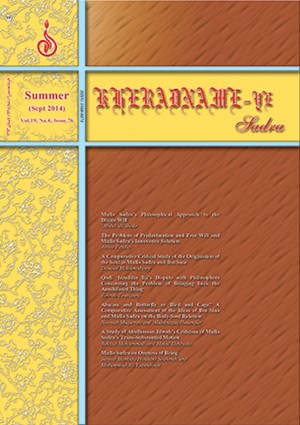-
-
List of Articles
-
Open Access Article
1 - سرمقاله
Seyyed Mohammad Khamenei -
Open Access Article
2 - Mulla Sadra’s Philosophical Approach to the Divine Will
Abdolali Shokr -
Open Access Article
3 - The Problem of Predestination and Free Will and Mulla Sadra’s Innovative Solution
Akbar Faydei -
Open Access Article
4 - A Comparative Critical Study of the Origination of the Soul in Mulla Sadra and Ibn Sina
Davood Mohamadiany -
Open Access Article
5 - Qadi ‘Izzuddin Iiji’s Dispute with Philosophers Concerning the Problem of Bringing back the Annihilated Thing
Zohreh Tavaziany -
Open Access Article
6 - Abscess and Butterfly or Bird and Cage? A Comparative Assessment of the Ideas of Ibn Sina and Mulla Sadra on the Body-Soul Relation
Abdolrazzaq Hesamifar -
Open Access Article
7 - A Study of Abulhassan Jilwah’s Criticism of Mulla Sadra’s Trans-Substantial Motion
Behzad Mohammadi Mehdi Dehbashi -
Open Access Article
8 - Mulla Sadra on Oneness of Being
Seyyed Morteza Hosseini Shahroudi Mohammad Ali Vatandoust
-
The rights to this website are owned by the Raimag Press Management System.
Copyright © 2017-2026







